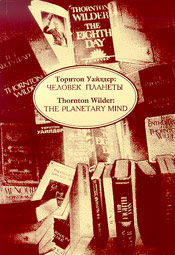by Tatiana Kabanova
 It has been said that Thornton Wilder possessed one of the great interplanetary minds of the twentieth century. His work as an American novelist and playwright has been imported by countries around the world. At the outset of the twenty-first century, students worldwide are discovering or rediscovering Wilder, and scholars world-wide are reexamining his work.
It has been said that Thornton Wilder possessed one of the great interplanetary minds of the twentieth century. His work as an American novelist and playwright has been imported by countries around the world. At the outset of the twenty-first century, students worldwide are discovering or rediscovering Wilder, and scholars world-wide are reexamining his work.
The distinguished Russian scholar Tatiana Kabanova is the author of a recently released new edition of Thornton Wilder: The Planetary Mind [edited by L.Bogdetskaya, T.Kabanova, A.Orusbaev. 2nd ed.- Bishkek:K-RSU,2001. 234pages.] The book publishes the proceedings of the International Conference “Thornton Wilder:The Planetary Mind” held as part of Thornton N. Wilder’s Centennial in Bishkek, Kyrgyzstan (May,1997). The first edition of the book was printed in 1999.
Dr. Kabanova has provided the following description of the book:
Published in Kyrgyzstan, a borderline Central Asian state, Thornton Wilder: The Planetary Mind brings back a cultural notion of the historic Silk Way as a “bridge” between East and West. The collection offers sixteen essays and articles in English and Russian. These essays feature a unique collaboration between scholars from the United States, Russia and Central Asia. They focus on the planetary impact of Thornton Wilder’s writings in a wide spectrum of literary, philosophical, linguistic and educational aspects of his legacy. Altogether, they recognize the American writer as a universal thinker, who crossed the borders of his national literature, inspired by the vision of the world as “an indivisible unit.”
This attitude shapes the core of Wilder’s humanism and explains the phenomenon of his at-homeness in foreign cultures, where his recognition is much higher than in his own land. According to Wilder, “the differences between languages and cultures begin to grow less marked to one who is accustomed to contemplate the human spirit.” It wouldn’t be surprising to discover Thornton Wilder contemplating the wisdom of the East– The Upanishads and The Bhagavad-Gita of the ancient Hindu, or Zen philosophy, or Mahatma Gandhi’s ethics. The study of Wilder’s writings in the context of the Western tradition, reveals a remarkable amplitude of cultural references, from Shakespeare to modern authors (Russian, Asian, Western -European) to Puritan thought to the “perennial” and “noosheric” philosophy of the twentieth century. Theoretical problems of genre, style and poetics are also represented in the book.

